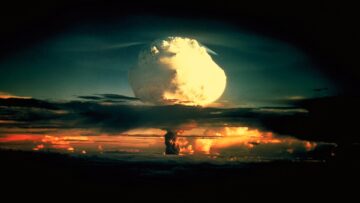Nicholas Dirks in Undark:
 REVOLTS AGAINST SCIENCE are often deeply irrational, as we witnessed during the Covid-19 pandemic, with political polarization around lifesaving vaccines and critical public health measures. But public distrust of science has too often been enabled through its manipulation by corporate interests, including big tobacco and oil, as well as by the dangers associated with its use in war.
REVOLTS AGAINST SCIENCE are often deeply irrational, as we witnessed during the Covid-19 pandemic, with political polarization around lifesaving vaccines and critical public health measures. But public distrust of science has too often been enabled through its manipulation by corporate interests, including big tobacco and oil, as well as by the dangers associated with its use in war.
The closing moments of Christopher Nolan’s Academy Award-nominated film “Oppenheimer” — based on the biography “American Prometheus” — depict a fictional scene in which the physicist is speaking with Albert Einstein by a pond at the Institute for Advanced Study in Princeton, New Jersey. Oppenheimer reminds Einstein of the time several years earlier, during the Second World War, when he asked him whether he thought there was any chance that nuclear fission might set off a chain reaction that would destroy the world. Einstein had refused to offer an opinion, and Oppenheimer continued his work to develop the bomb.
Looking wistfully away from Einstein, he says that perhaps it did — that the bomb did set off an uncontrollable chain reaction that would, in the end, destroy the world. These final words give the lie to his hope that such a terrible weapon would stop all wars, an admission of his failure to fully anticipate the political reality of nuclear power.
Oppenheimer’s ambivalence is in a larger sense the story of modern-day science.
More here.
